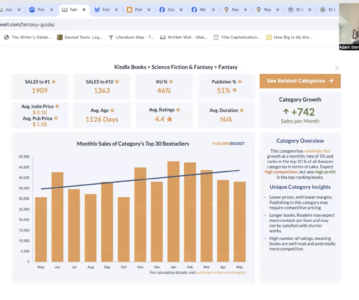First time visiting the Essentials section? Read this article to help you navigate this portion of Written Well.
 Using the Appropriate Amount of Realism in Your Writing
Using the Appropriate Amount of Realism in Your Writing
Like everything else in writing, the appropriate amount of realism is going to be very genre dependent. If you’re writing a gritty crime story, you’re going to want a lot of it; a fairy tale romance, maybe not so much. But how do you decide how much realism is right for your story, and how do you go about putting it in (or taking it out)? Let’s start with some examples. The first is from a story I was critiquing that was written by a very good writer. And one of the things this writer does extremely well is write...
 7/1/24 — July Trends and Opportunities
7/1/24 — July Trends and Opportunities
Lead Instructor Adam breaks gives you the June numbers and breaks down the major trends. Also covers a concept called “List poisoning.”...
 Writing to Market — Keyword Interest and Bestseller Lists
Writing to Market — Keyword Interest and Bestseller Lists
In Writing to Market — Where to Begin, I talked about how I use Publisher Rocket’s category search function to identify potential categories to write in. We’re going to leave that program for now, and go to Amazon to look at the bestseller lists. Because nothing can kill a category quicker for you than a bad-looking bestseller list. As an example, let’s say you liked horror as a top tier category. And why wouldn’t you? It’s got a 41% pub percentage for a steady 12.5k in sales. The top books move big numbers. But let’s take a look at the...
 Writing to Market — Tropes, Tropes, Tropes
Writing to Market — Tropes, Tropes, Tropes
The theory of writing to market is that most people don’t want to read something completely new. They want to read something like the last book they enjoyed. A new story, but one that makes them feel the same way as they did the last time. Essentially, they want to read the same thing, but different. Strangely, this is not contradictory, and is fairly easy to accomplish. The way to do it is through tropes. Tropes Tropes are not quite cliches, but they are in the same ballpark. They are certain characters or situations that people are familiar with and...
 Writing to Market — Where to Begin
Writing to Market — Where to Begin
There’s a lot of confusion about what writing to market actually is. Let’s clear that up. Writing to market is actually a simple two-step process: you identify a good market, then you write a book that fits that market. Obviously, there is far more to it than that, but that is the basis of it. Find a market. Write a book for that market. And one must do both to successfully write to market. I have seen people find a great genre, then write a book no readers of that genre would enjoy. I have seen people write wonderful books...
 Going Wide
Going Wide
There are two schools of thought in the Indie Publishing world that you need to be aware of. I can’t tell you which will be right for your career, but you should understand both so you can make informed choices. *** YOU ARE RESPONSIBLE FOR YOUR OWN CAREER*** Option One is what we call narrow. Amazon has Kindle Unlimited (KU), which is a subscription service they offer. Readers pay a monthly fee ($12/m as I write this) and get to read as many books as they can digest. Think library where you finish one, download the next, and keep going...
 6/1/24 June Trends and Opportunities
6/1/24 June Trends and Opportunities
Adam breaks down the numbers generated in May and talks about the upcoming opportunities they represent....
 Why All the Genres?
Why All the Genres?
I have run into a form of this question several times now since we have opened the site. People understand, of course, why we do all the genres, but they don’t understand why that is a good thing for them, in particular. “I write cozy mystery. Why do I care about a dark fantasy guide?” It’s actually a good question, with two answers. First of all, there is something to be learned from every genre. No matter what genre you write, you can write it better by borrowing aspects of other genres. I write primarily fantasy, but I studied thrillers...
 Narrowcasting and Newsletters
Narrowcasting and Newsletters
Originally, I intended to write about Newsletters as a thing, but realized as I sat down that I needed to back up a step and talk about what I think is the future of indie publishing. That turned into a whole series of thoughts on vocabulary—and you need a good solid grasp on words to understand how to work in this field—and I realized that I needed to start here. Broadcasting In the old days, everybody knew the term broadcasting. You transmitted a powerful radio signal that could be picked up at a significant distance by anybody with the right...
 Private Investigator/Hard-Boiled Study Materials
Private Investigator/Hard-Boiled Study Materials
Study materials for the private investigator/hard-boiled genres










